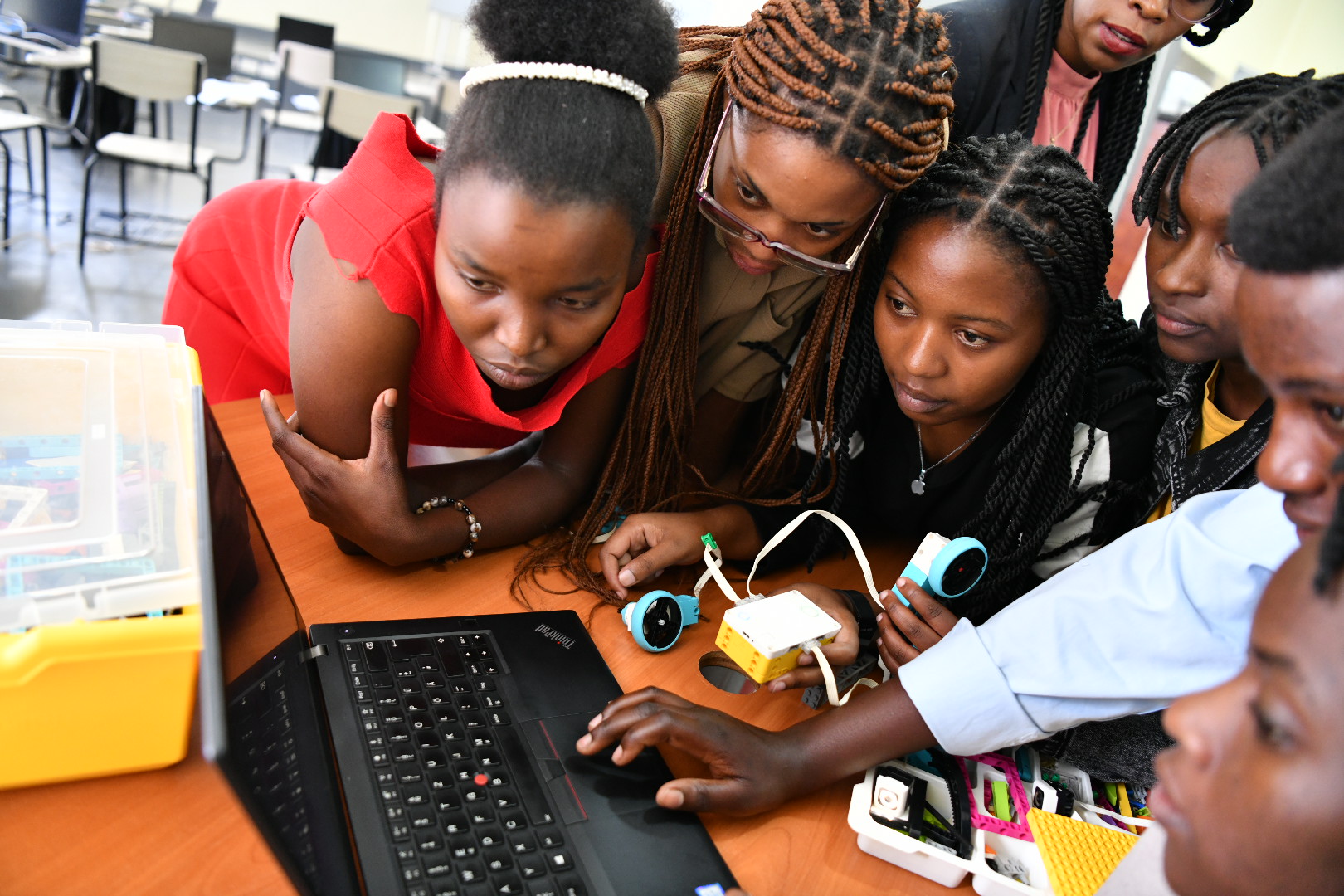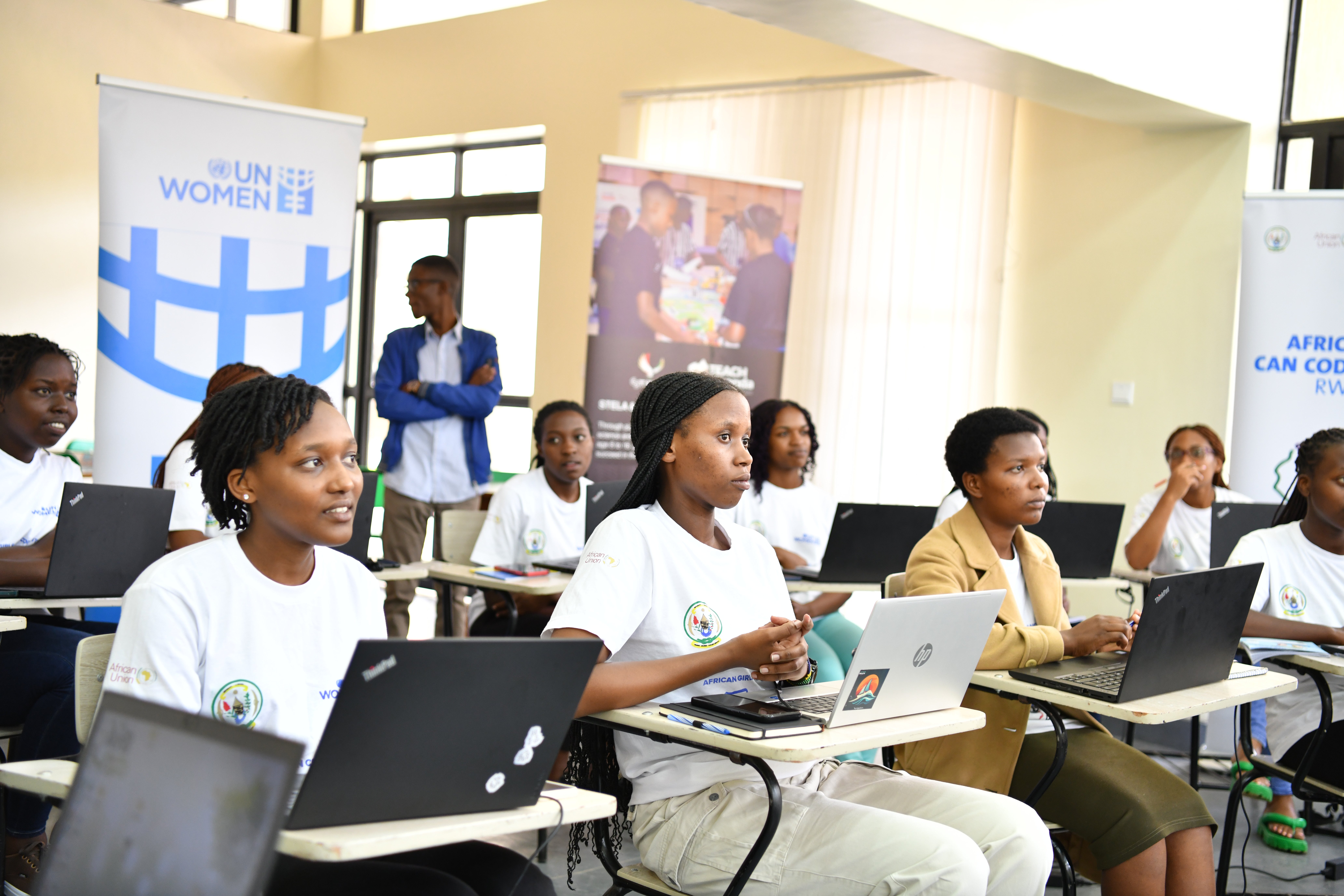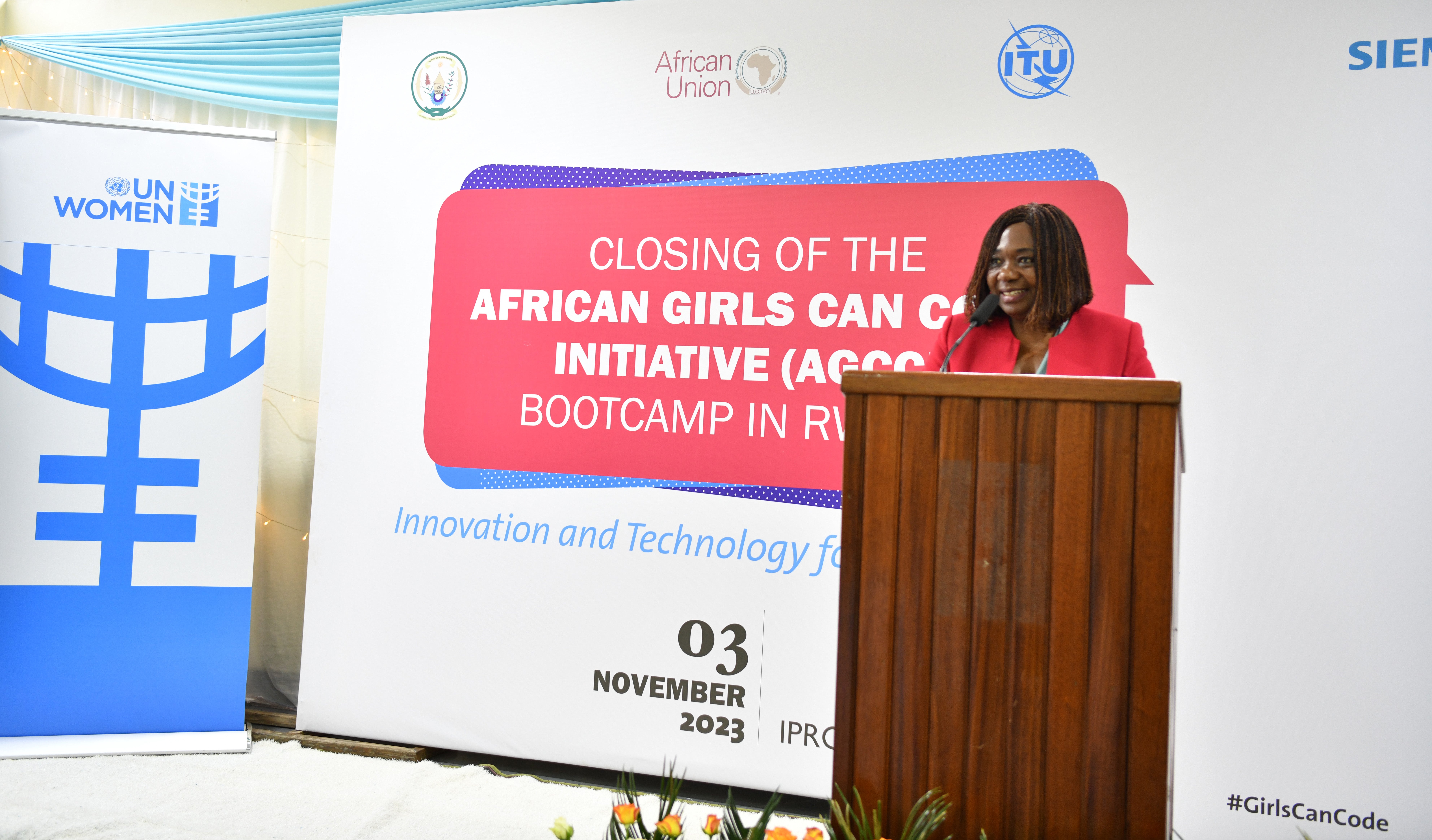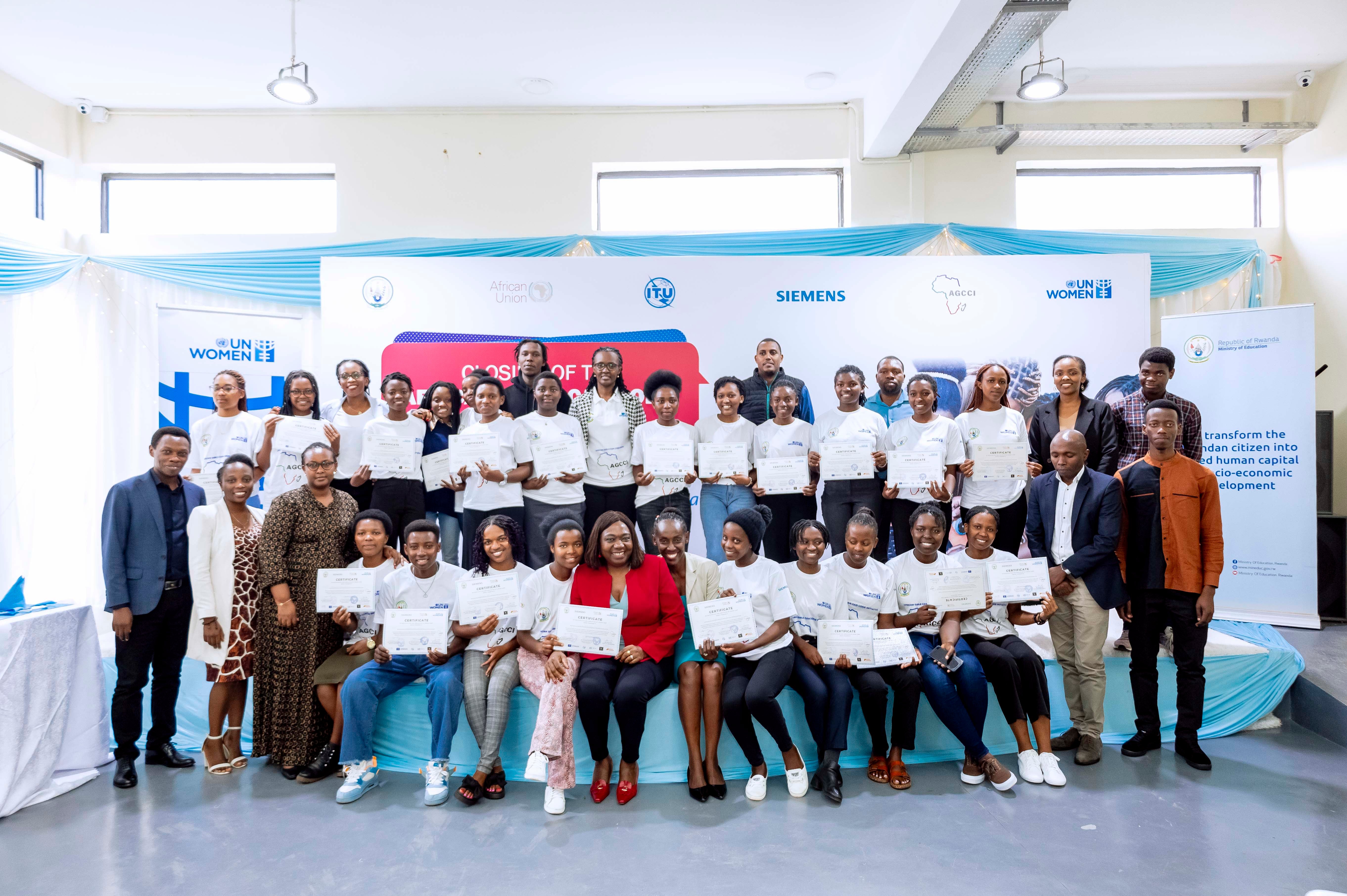Honing the limitless potential of young girls to bridge the gender digital divide in Rwanda through the African Girls Can Code Initiative
Date:

“This transformative experience has not only equipped us with technical skills but has opened our eyes to the immense potential and unreached talent that lies within the hearts of young African girls.” – Denyse Muhoza, a participant of the first AGCCI coding bootcamp in Rwanda.
Nestled in the altitudinous hills of Rulindo District lies the Integrated Polytechnic Regional Centre (IPRC) -Tumba, one of Rwanda’s leading Science, Technology, Engineering, and Mathematic (STEM) institutions. Halls and classrooms commonly filled with the determined footsteps and attention of young women and men eager to advance their studies in STEM, IPRC Tumba over a two-week period became a haven for 23 young female high school graduates, eager to transform interest into concrete action to bridge the gender digital divide in Rwanda.
Nationally launched in July 2023 by the UN Women Regional Director on the sidelines of Women Deliver Summit, the African Girls Can Code Initiative (AGCCI) is a Pan-African initiative that sets out to bridge the gender digital gap by empowering young girls between the ages of 17-25 to become programmers, innovators, creators, and leaders in the realm of ICT and STEM. In Rwanda, the initiative is spearheaded through partnerships between UN Women, the Ministry of Education, Ministry of Gender and Family Promotion, and Ministry of ICT and Innovation.
Following the official launch where 50 high achieving girls were awarded laptops to facilitate their training and learning, UN Women and partners organized the first national AGCCI coding camp between 23rd October and 3rd November 2023. Over this two-week period, participating girls set course on a journey to strengthen their knowledge in coding, robotics, and key gender equality concepts that would provide a solid foundation for their future education and professional development.

Coming into the training, Natacha Sangwa expected a bootcamp that would solely focus on traditional coding schemes, but to her surprise, the multi-dimensional curriculum broadened her perspectives on the divergent layers of ICT, and of equal importance, its intersection to gender equality.
“When I was first invited to participate in the bootcamp, I thought I would only be learning about different programming languages. However, this camp has been truly transformative as I actually got to learn more about robotics, next generation technologies, and how to leverage these resources to bring about positive change to my community and beyond. One of the ideas I developed through this programme is to build mechanized irrigation systems to enhance productivity and yields in rural areas. Additionally, I now have a clear understanding of the relationship between gender and technology, and plan to do all I can to increase the representation of women and girls in this field.” testified Natacha.
Over the two consecutive weeks, facilitated by 7 highly qualified trainers, participating girls went through a comprehensive curriculum, covering a wide array of topics including SPIKE PRIME Robotics programming, Virtual Reality, Mobile Application Development, Cyber Risks of ICTs for Women, Gender mainstreaming in coding, and much more.

Through this curriculum, the girls explored challenges, opportunities and developed prototypes as solutions to some of the most pressing and persistent global issues that we currently face, including climate change, inconsistent agricultural productivity, cyber security, and more.
Beyond technical capacity building, the AGCCI aims to facilitate young women`s access to effective mentorship opportunities. Through partnership with Siemens, all participating girls received full access to the “SieMent EmpowHer Mentorship Programme” that provides extensive courses in STEM related subjects, but most importantly, links each of the girls with prominent women within the sector to serve as mentors over a 6-month period to share experiences, lessons learned, and offer guidance to facilitate a clear direction for the achievement of each girl`s unique professional ambitions.
“Learning about the Siemens mentorship programme was very inspiring. Getting the opportunity to be linked to a role model and mentor who can guide me will greatly help me in my journey, enabling me to also be impactful to other girls in the near future.” said Odda Sanny Niyegena, one of the participating girls from the AGCCI bootcamp.
Concluding the training, a vibrant closing ceremony was held which brought together partners from government, private sector, academia, and the media to witness and hear from the girls themselves about the impact the bootcamp had on their development. Participating girls gave testimonies and robotics demonstrations to showcase the tangible results of the intensive two-week bootcamp.

Speaking to the importance of the AGCCI towards bridging the gender digital divide, the UN Women Country Representative, Ms. Jennet Kem highlighted the critical role of such initiatives in transforming mindsets and social cultural norms that limit women and girls from fully participating in ICT and coding sectors.
“As a result of this training, the participating girls now have a clear understanding of the intersectionality between gender and technology. With this newfound knowledge, the girls will set a positive example to other young girls, and act as ambassadors in their environments to bridge the gender gap in technology, but also in socio-cultural mindsets that have persistently kept girls away from this field. Our target is to leverage this first coding camp to bring on board more partners to enable us to empower even more young girls in Rwanda.” highlighted Ms. Jennet Kem

Closing the two-week bootcamp as the guest of honor, the Permanent Secretary of the Ministry of Gender and Family Promotion, Mrs. Mireille Batamuliza inspired all girls present to break negative stereotypes and keep pushing towards the achievement of their aspirations to become leaders and role models in the digital sphere.
“As the first participants of the AGCCI in Rwanda, you are now the ambassadors of this programme. I encourage you all to build on the acquired skills, knowledge, and networks you have gained over the past two weeks to innovate and find solutions to accelerate Rwanda`s development targets. I also urge you to share your experiences with other girls to break stereotypes and be a leading example to the collective benefits that come from bridging the gender digital gap. The closing of this bootcamp marks the beginning of the next phase of your journey.”
Creating a solid foundation for the AGCCI in Rwanda through this bootcamp, UN Women and partners endeavor to enhance the impact of this initiative in its second phase by reaching even more girls across the country and fostering new partnerships that will secure its sustainability, scale, and influence.
The African Girls Can Code Initiative (AGCCI) was commissioned by UN Women, and the International Telecommunication Union (ITU) in collaboration with the African Union Commission (AUC) Department of Health, Humanitarian Affairs and Social Development and Department of Women, Gender, and Youth Division.